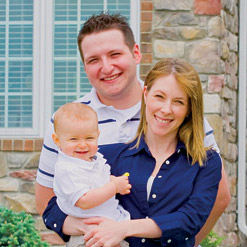
I often hear two misconceptions regarding trusts. First, many people believe that because their net worth is under $2,000,000 (the applicable exclusion amount in 2008), their estate plan does not require a trust. Second, many believe that because they have a trust, their estate plan is in tip-top shape with no room for improvement. When we dig a little deeper into their wishes, both of these conclusions are often incorrect. Even with a net worth of $200,000, a person will benefit from a trust. For those who already have a trust in place, they tend to know so little about what type of trust they have, and what assets are held within that trust, that they are unaware of what circumstances would warrant a change in their estate plan. In short, their trust gives them a false sense of security.
Trust basics
Generally, a trust is its own legal entity wherein an individual can contribute property during life, enjoy the use and/or control of that property during his or her lifetime and leave the property to his or her heirs upon death. The “grantor” creates the trust, the “trustee” manages the trust and the “beneficiaries” have a right to the corpus (the assets held within the trust) and/or income of the trust.
What are the advantages of a trust?
Wills and trusts are the two primary estate planning vehicles. Proper estate planning typically requires the use of a will, in combination with one or more trusts, in order to achieve an individual’s desired disposition of his or her estate with the least estate tax. There are two primary advantages to having a comprehensive estate plan—including one or more trusts—compared to simply having a basic will: 1) assets held in certain trusts avoid probate, and 2) estate tax on the gross estate may be reduced through the use of certain trusts.
What is probate and why would one want to avoid it? Probate is the court-supervised process by which an individual’s gross estate is transferred to his or her heirs after death. An individual’s gross estate includes all of the assets he or she owns at death, including savings accounts, real estate, retirement plans, insurance policies and business interests. Only assets owned by a decedent in his or her individual name may require probate.
Probate costs can range from three percent to five percent of the value of the gross estate in terms of attorney’s fees and court costs. The entire probate process can take months, or even years, to complete depending on the complexity of the estate. Regardless of the money and time consumed by probate, most individuals, particularly business owners, wish to avoid probate for another reason: maintaining their family’s privacy. Probate documents are a matter of public record and can be scrutinized by the general population. Assets held within certain trusts avoid probate because the trust holds title to the assets at the grantor’s death, not the grantor, individually.
What is the estate tax and why would one want to avoid it? In 2008, the value of a decedent’s gross estate in excess of $2,000,000 is subject to estate tax; the maximum estate tax rate is 45 percent. The assets in certain trusts are not includible in a decedent’s gross estate when the grantor makes a completed gift to the trust. A reduction in the gross estate leads to a reduction in estate tax liability payable by the estate.
What are the basic types of trusts?
The two main types of trusts are living trusts (or “inter vivos trusts”) and testamentary trusts. Living trusts are created during the life of the grantor, whereas testamentary trusts are created upon death of the grantor.
Testamentary trusts are typically created through a will. The will sets forth what assets are to be contributed to the testamentary trust. The testamentary trust stipulates the timing and conditions of distributions of the trust assets to the beneficiaries. For example, if a grandfather wishes to leave $100,000 to his granddaughter to fund her college education, the grandfather can ensure that the $100,000 is distributed to his granddaughter only for educational purposes. Because the property is in the grantor’s individual name at death, the property must be probated.
Living trusts are created during the grantor’s life, and they are either revocable or irrevocable. Revocable trusts can be revoked or altered by the grantor during the grantor’s lifetime; irrevocable trusts cannot. Both revocable and irrevocable trusts eliminate the need for probate because the trust holds title to the assets.
In general, revocable trusts provide the grantor greater flexibility and control over the trust assets. The grantor of a revocable trust typically designates himself or herself the trustee and the beneficiary during his or her lifetime. Because the grantor of a revocable trust does not entirely forfeit control of the revocable trust assets, those assets are includible in his or her gross estate.
Irrevocable living trusts are less flexible than revocable trusts because the grantor must relinquish control of the trust assets. Unlike the revocable trust assets, irrevocable trust assets are not includible in the grantor’s gross estate at death, reducing the estate tax payable by the estate on those assets. However, the grantor’s contributions to an irrevocable trust may be subject to gift tax.
Trusts are not one-size-fits-all
Beyond revocable and irrevocable living trusts, numerous other types of trusts exist. Some trusts are designed to hold only certain assets, such as life insurance trusts, and others are only appropriate for specific circumstances. An example of this is when the grantor wants to provide for a second wife after his death but wants his children from his first marriage to obtain the remainder of his estate after his second wife dies.
There is no one-size-fits-all trust. The type of trust or trusts appropriate for an estate depends on various factors, including an individual’s total net worth; the composition of the estate; the individual’s age and marital status; and most importantly, the individual’s personal goals and wishes in terms of his or her control over assets during life and the disposition of those assets after death. Whenever any of these circumstances change, the estate plan should be reviewed to ensure that it continues to fulfill the client’s original wishes with the least estate tax consequences.
want to avoid it? Probate is the court-supervised
process by which an individual’s
gross estate is transferred to his or her
heirs after death. An individual’s gross
estate includes all of the assets he or she
owns at death, including savings accounts,
real estate, retirement plans, insurance
policies and business interests. Only assets
owned by a decedent in his or her individual
name may require probate.




